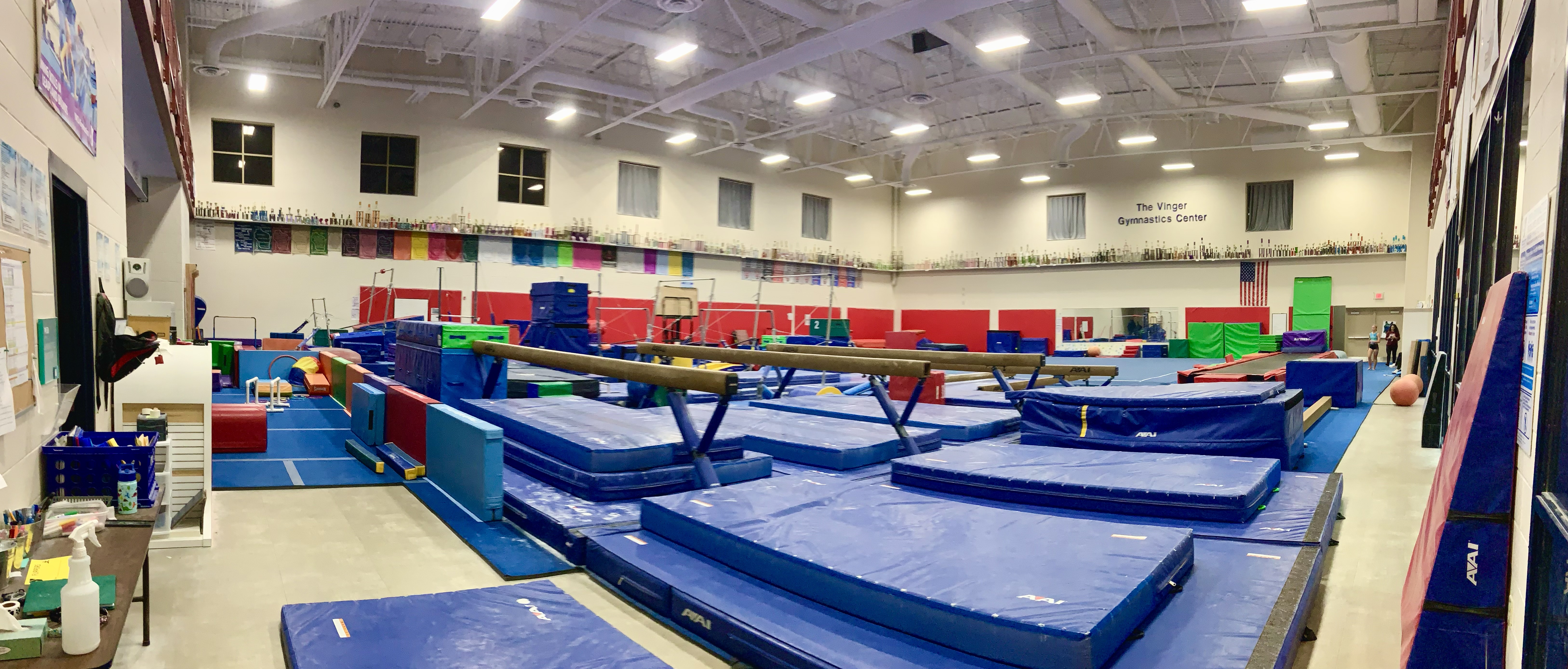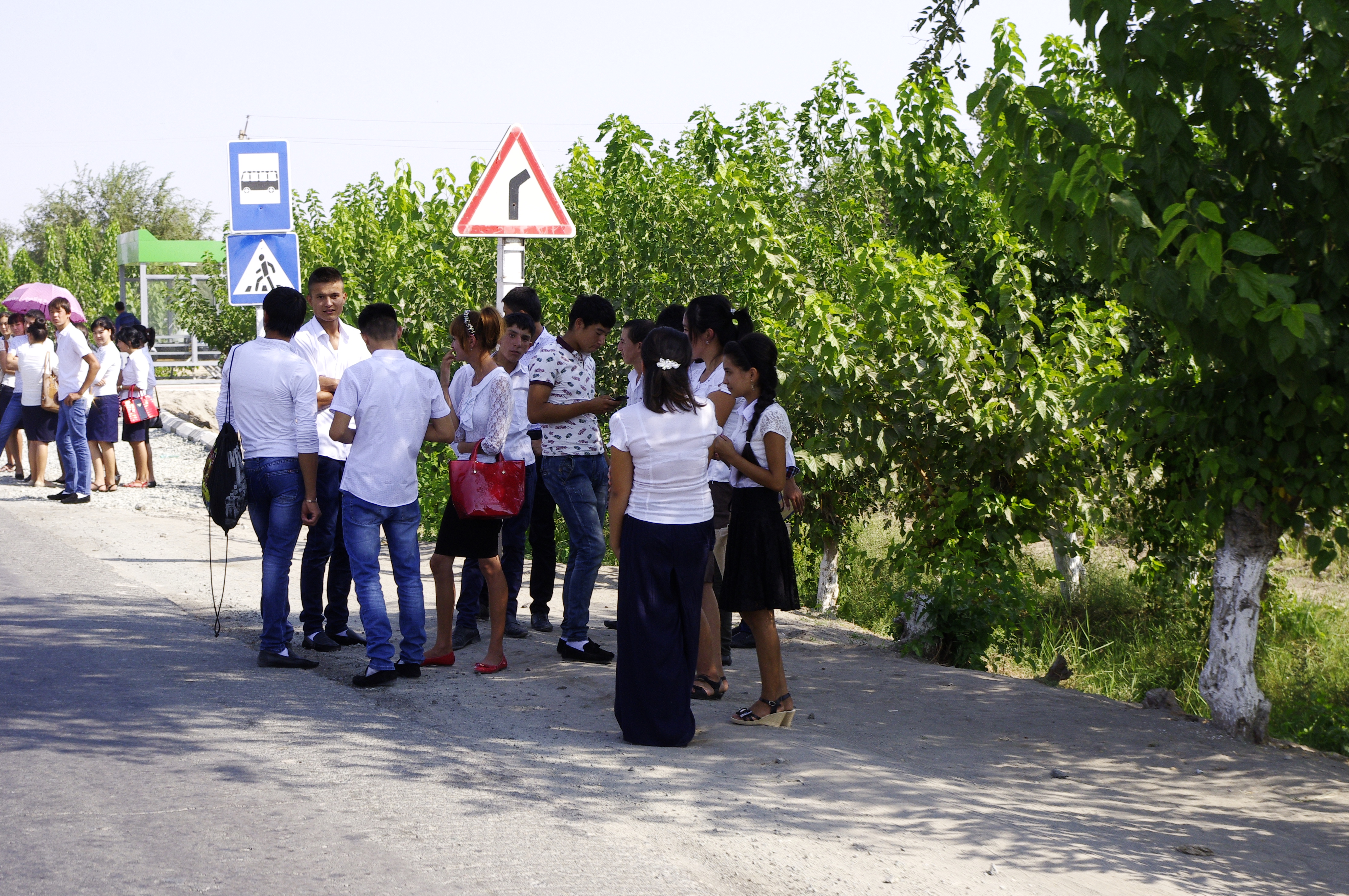|
Sevara Safoeva
Sevara Sevdiyor qizi Safoeva (born 19 November 2002) is an Uzbekistani group rhythmic gymnast who represented Uzbekistan at the 2020 Summer Olympics. She also competed at the 2018 and 2019 World Championships. Career Safoeva took up rhythmic gymnastics in 2010 at age seven. She became age-eligible for senior competitions and joined the national group in 2018. At the 2018 World Championships, the Safoeva and the Uzbekistani group finished 17th in the all-around. At the 2019 Asian Championships in Thailand, Safoeva and the Uzbekistani group won two gold medals, as well as a silver in the all-around. They won the group all-around silver medal at the 2019 Tashkent World Cup. She then competed at the 2019 World Championships, where the group finished 14th in the all-around and did not receive one of the available Olympic berths. Safoeva helped Uzbekistan win bronze medals in both apparatus finals and place fourth in the all-around at the 2020 Moscow Grand Prix. At the 2020 Ta ... [...More Info...] [...Related Items...] OR: [Wikipedia] [Google] [Baidu] |
Navoiy
Navoiy ( ; ) is a city and the capital of Navoiy Region in the central part of Uzbekistan. Administratively, it is a district-level city, that includes the urban-type settlement Tinchlik, Navoiy, Tinchlik. The city is named after Alisher Navoiy. As of 2024, its population was 161,300 inhabitants. History The city was founded in 1958, near the "Old city" originally known as Karmana under the Emirate of Bukhara, under the name of the great poet and statesman Alisher Navoiy, who wrote in Persian language, Persian and Chagatai language, Chaghatai at the court of Emir Husein Boykara (or Husayn Bayqarah, Husayn Bayqaro) in Herat. Even though the town is very young, it has rich history in this area and its surroundings. The Great Silk Road went through the region in ancient times. Archeological research in the area has also produced findings of numerous traces of Ancient Saki, Khorezm and Baktriya cultures. Government Population Main sites * The Rabati Malik is a heavily f ... [...More Info...] [...Related Items...] OR: [Wikipedia] [Google] [Baidu] |
FIG World Cup
FIG World Cup refers to a number of events organized by the International Gymnastics Federation (FIG) across seven competitive gymnastics disciplines: 1) acrobatic gymnastics, 2) aerobic gymnastics, 3) men's artistic gymnastics, 4) women's artistic gymnastics, 5) women's rhythmic gymnastics, 6) trampoline and tumbling, and 7) parkour. History The FIG hosted the first Artistic Gymnastics World Cup on an international scale in 1975. This event was an original competition reserved for the best gymnasts, bringing together competitors in all-around competition and in apparatus finals. This initiative was taken in a particular context, since the World Artistic Gymnastics Championships took place every four years. In 1983, FIG decided to hold a Rhythmic Gymnastics World Cup for the first time, after six editions of the Artistic Gymnastics World Cup. At the time, the World Rhythmic Gymnastics Championships were also held every four years. The World Cup events were upheld only until 1990, ... [...More Info...] [...Related Items...] OR: [Wikipedia] [Google] [Baidu] |
Gymnasts At The 2020 Summer Olympics
Gymnastics is a group of sport that includes physical exercises requiring balance, strength, flexibility, agility, coordination, artistry and endurance. The movements involved in gymnastics contribute to the development of the arms, legs, shoulders, back, chest, and abdominal muscle groups. Gymnastics evolved from exercises used by the ancient Greeks that included skills for mounting and dismounting a horse. The most common form of competitive gymnastics is artistic gymnastics (AG); for women, the events include floor, vault, uneven bars, and balance beam; for men, besides floor and vault, it includes rings, pommel horse, parallel bars, and horizontal bar. The governing body for competition in gymnastics throughout the world is the Fédération Internationale de Gymnastique (FIG). Eight sports are governed by the FIG, including gymnastics for all, men's and women's artistic gymnastics, rhythmic gymnastics (women's branch only), trampolining (including double mini-trampoline ... [...More Info...] [...Related Items...] OR: [Wikipedia] [Google] [Baidu] |
Uzbekistani Rhythmic Gymnasts
Demographic features of the population of Uzbekistan include population growth, population density, ethnicity, education level, health, economic status, religious affiliations, and other aspects of the population. The nationality of a person from Uzbekistan is Uzbekistani, while the ethnic Uzbek majority call themselves Uzbeks. Much of the data is estimated because the last census was carried out in Soviet times in 1989. Overview Uzbekistan is Central Asia's most populous country. Its 36.8 million people (as of January 2024) comprise nearly half the region's total population. The population of Uzbekistan is very young: 30.1% of its people are younger than 14. According to official sources, Uzbeks comprise a majority (84.4%) of the total population. Other ethnic groups, as of 1996 estimates, include Russians (2.1% of the population), Tajiks (4,8%), Kazakhs (3%), Karakalpaks (2.5%), and Tatars (1.5%). Uzbekistan has an ethnic Korean population that was forcibly relocated to the ... [...More Info...] [...Related Items...] OR: [Wikipedia] [Google] [Baidu] |
People From Navoiy Region
The term "the people" refers to the public or common mass of people of a polity. As such it is a concept of human rights law, international law as well as constitutional law, particularly used for claims of popular sovereignty. In contrast, a people is any plurality of persons considered as a whole. Used in politics and law, the term "a people" refers to the collective or community of an ethnic group or nation. Concepts Legal Chapter One, Article One of the Charter of the United Nations states that "peoples" have the right to self-determination. Though the mere status as peoples and the right to self-determination, as for example in the case of Indigenous peoples (''peoples'', as in all groups of indigenous people, not merely all indigenous persons as in ''indigenous people''), does not automatically provide for independent sovereignty and therefore secession. Indeed, judge Ivor Jennings identified the inherent problems in the right of "peoples" to self-determination, as i ... [...More Info...] [...Related Items...] OR: [Wikipedia] [Google] [Baidu] |
Living People
Purpose: Because living persons may suffer personal harm from inappropriate information, we should watch their articles carefully. By adding an article to this category, it marks them with a notice about sources whenever someone tries to edit them, to remind them of WP:BLP (biographies of living persons) policy that these articles must maintain a neutral point of view, maintain factual accuracy, and be properly sourced. Recent changes to these articles are listed on Special:RecentChangesLinked/Living people. Organization: This category should not be sub-categorized. Entries are generally sorted by family name In many societies, a surname, family name, or last name is the mostly hereditary portion of one's personal name that indicates one's family. It is typically combined with a given name to form the full name of a person, although several give .... Maintenance: Individuals of advanced age (over 90), for whom there has been no new documentation in the last ten ... [...More Info...] [...Related Items...] OR: [Wikipedia] [Google] [Baidu] |
Gymnastics At The 2020 Summer Olympics – Women's Rhythmic Group All-around
The Women's rhythmic group all-around competition at the 2020 Summer Olympics were held at the Ariake Gymnastics Centre in Tokyo, Japan, with the qualification taking place at 7 August and the final on 8 August. Russian rhythmic gymnasts were the five-time defending champions in the event. Competition format The competition consisted of a qualification round and a final round. The top eight teams in the qualification round advance to the final round. In each round, the teams perform two routines (one with 5 balls, one with 3 hoops and 2 pairs of clubs), with the scores added to give a total. Results Qualification Source: Final References {{DEFAULTSORT:Gymnastics at the 2020 Summer Olympics - Women's rhythmic group all-around rhythmic group all-around 2020 The year 2020 was heavily defined by the COVID-19 pandemic, which led to global Social impact of the COVID-19 pandemic, social and Economic impact of the COVID-19 pandemic, economic disruption, mass ... [...More Info...] [...Related Items...] OR: [Wikipedia] [Google] [Baidu] |
Nilufar Shomuradova
Nilufar Oʻtkirovna Shomuradova (born 7 July 1999) is an Uzbekistani former rhythmic gymnast and team captain of the national group. She represented Uzbekistan at the 2020 Summer Olympics and is a five-time Asian champion. Career Shomuradova took up rhythmic gymnastics in 2003, at the age of four. She joined Uzbekistan's senior national group in 2016 and moved to Tashkent. She competed at the 2018 World Championships, where the Uzbekistani group finished 17th in the all-around. At the 2019 Asian Championships in Thailand, Shomuradova and the Uzbekistani group won two gold medals, as well as a silver in the all-around. She then competed at the 2019 World Championships, where the group finished 14th in the all-around and did not receive one of the available Olympic berths. Shomuradova and the group won two bronze medals at the 2021 Moscow Grand Prix, including in the all-around. Then at the 2021 Tashkent World Cup, they won the group all-around gold medal. This marked the fir ... [...More Info...] [...Related Items...] OR: [Wikipedia] [Google] [Baidu] |
Kseniia Aleksandrova
Kseniia Nikolaevna Aleksandrova (born 8 September 2000) is an Uzbekistani group Rhythmic gymnastics, rhythmic gymnast who represented Uzbekistan at the 2020 Summer Olympics. She won two gold medals at the 2019 Asian Rhythmic Gymnastics Championships, 2019 Asian Championships and three gold medals at the 2021 Asian Rhythmic Gymnastics Championships, 2021 Asian Championships. Career Aleksandrova began artistic gymnastics when she was six years old but switched to rhythmic gymnastics a year later. She joined Uzbekistan's national group in 2016. At the 2017 Asian Rhythmic Gymnastics Championships, 2017 Asian Championships, Aleksandrova helped Uzbekistan win the silver medal in the 5 balls final, behind Japan, and they finished fourth in the all-around. She then competed at the 2017 Rhythmic Gymnastics World Championships, 2017 World Championships, and the group finished 10th in the all-around. They did not advance into either apparatus final. Then at the 2018 World Rhythmic Gymnast ... [...More Info...] [...Related Items...] OR: [Wikipedia] [Google] [Baidu] |
Dinara Ravshanbekova
Dinara Davronbekovna Ravshanbekova (born 25 September 1999) is an Uzbekistani group rhythmic gymnast who represented Uzbekistan at the 2020 Summer Olympics. She also competed at the 2017, 2018, and 2019 World Rhythmic Gymnastics Championships. Career Ravshanbekova began rhythmic gymnastics when she was six years old. She began competing internationally with the Uzbekistan national group in 2017. Ravshanbekova helped Uzbekistan win the silver medal in the 5 balls final, behind Japan, at the 2017 Asian Championships, where they also finished fourth in the all-around. She competed at her first World Championships in 2017, and the group finished 10th in the all-around. Then at the 2018 World Championships, the group finished 17th in the all-around. Ravshanbekova helped Uzbekistan win the group all-around silver medal at the 2019 Tashkent World Cup. Then at the 2019 Asian Championships, they won another group all-around silver medal, and they won both apparatus finals titles. ... [...More Info...] [...Related Items...] OR: [Wikipedia] [Google] [Baidu] |
Kamola Irnazarova
Kamola Oybekovna Irnazarova (born 25 April 2002) is an Uzbekistani group rhythmic gymnast who represented Uzbekistan at the 2020 Summer Olympics. She won five gold medals at the Asian Championships and competed at two World Championships. Early life Irnazarova was born on 25 April 2002, in Tashkent. She has a younger sister named Madina who is also a rhythmic gymnast who competed at the 2019 Junior World Championships. She began rhythmic gymnastics when she was three years old. Gymnastics career Irnazarova joined Uzbekistan's national group in 2017. She competed at her first World Championships in 2018 where the Uzbek group finished 17th in the all-around. Irnazarova helped Uzbekistan win a silver medal in the group all-around at the 2019 Tashkent World Cup. They did not win medals in either apparatus final. They then won another all-around silver medal at the 2019 Asian Championships and won gold medals in both apparatus finals. At the 2019 World Championships, Irnazar ... [...More Info...] [...Related Items...] OR: [Wikipedia] [Google] [Baidu] |



